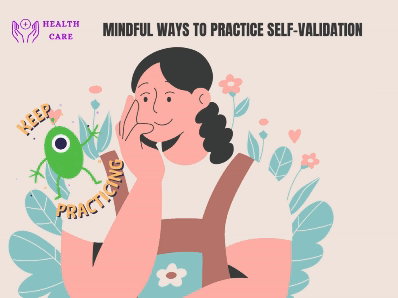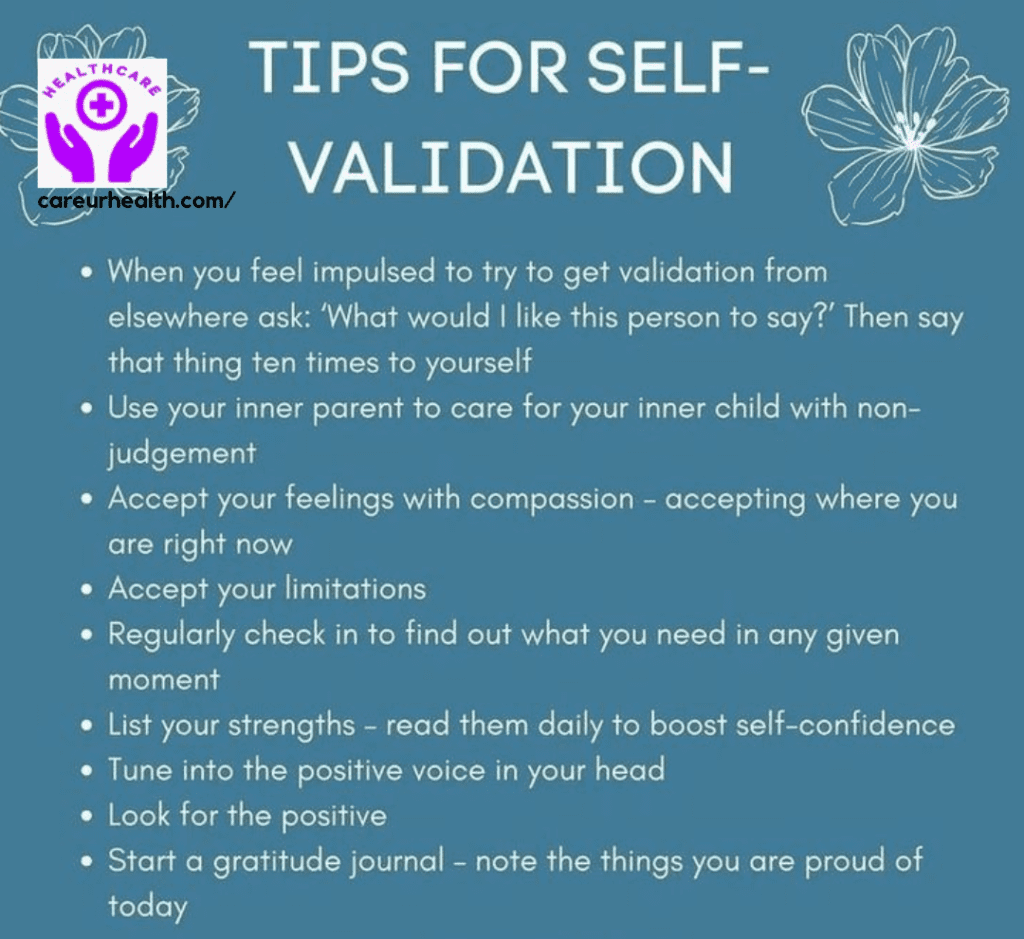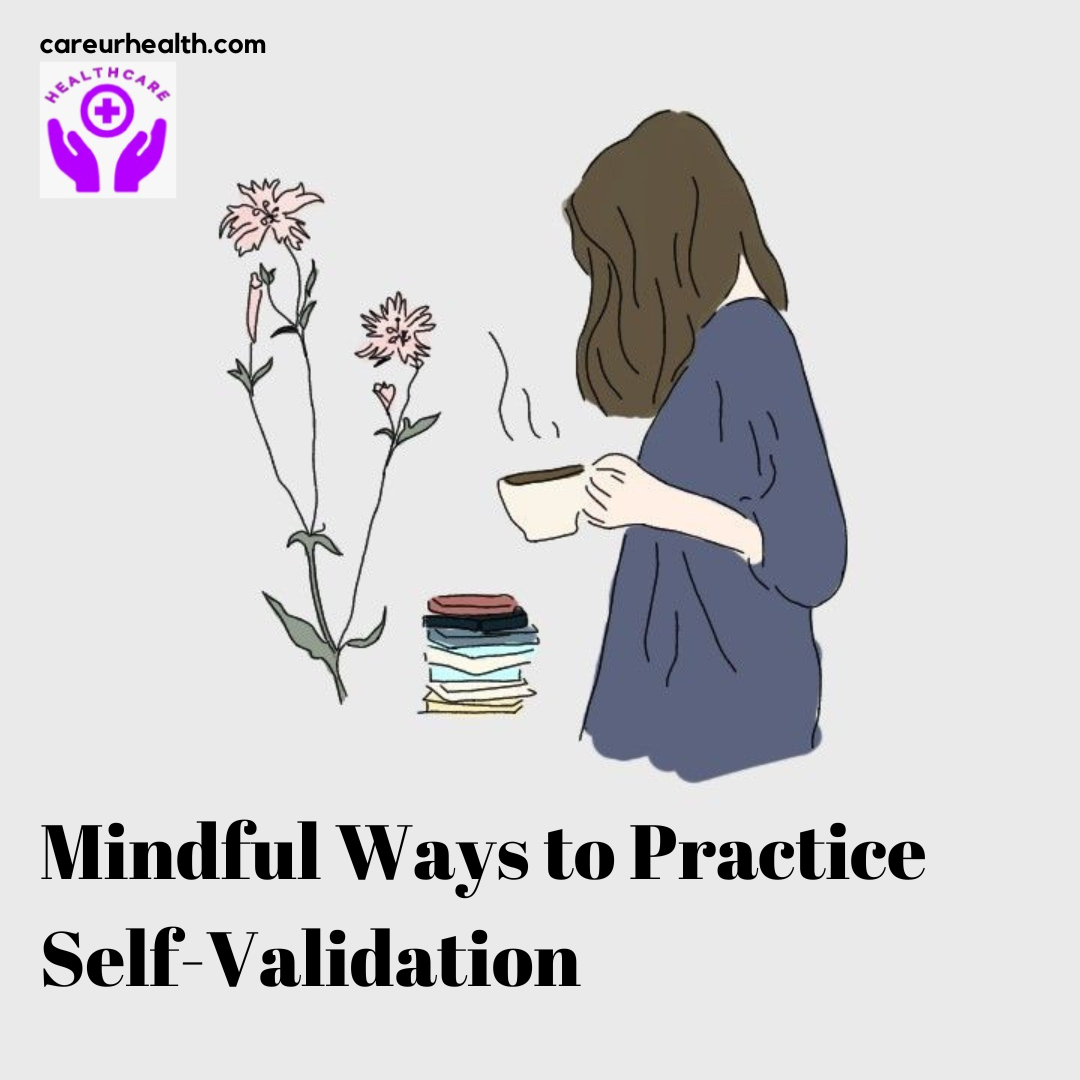It’s simple to ignore the potent practice of self-validation in a culture where external validation frequently takes the front stage. We may feel unhappy and distant from our actual selves if we pursue other people’s praise incessantly.
This is where the practice of self-validation comes into play, providing a way to inner fulfilment and true self-worth. Mindful ways to practice self-validation
In this article, we explore mindful strategies for cultivating a better and more genuine connection with ourselves as we enter into the transformational world of self-validation. Self-validation brings lasting and profound fulfilment, whilst external validation may only give temporary pleasure.
It is the rock that keeps us afloat in times of uncertainty and the wellspring of self-compassion that can treat the most severe emotional wounds.
We’ll explore the concepts of mindfulness, self-awareness, and self-acceptance, learning methods and approaches that let us observe our emotions, ideas, and accomplishments without passing judgment on them.
We develop more resiliency and self-assurance by accepting self-validation, and we open the door to deeper connections with others. Join us as we discover the self-validation secrets and set out on a journey to a more peaceful and fulfilled life where self-validation begins from the inside.

1. Self-Reflection
The foundational technique of self-reflection is where mindful ways to practice self-validation start. Throughout this process, one participates in a thorough and intentional study of their ideas, feelings, and experiences.
It acts as a cornerstone for improving emotional stability and self-awareness. Individuals might use mindful ways to practice self-validation through self-reflection by objectively evaluating their inner environment.
Mindful self-reflection is examining one’s feelings and ideas with attention, recognizing their existence, and comprehending their causes and effects.
It enables us to accept all emotions as legitimate and necessary components of the human experience without categorizing them as “good” or “bad.” This act of non-judgmental acceptance is a potent kind of self-validation. Since it acknowledges the truth and merit of our sentiments.
Additionally, attention is essential for this procedure. To completely engage in their inner world during self-reflection, people must be present in the moment. A greater connection with one’s ideas and feelings is fostered by this presence, allowing for a deeper degree of self-validation.
In summary, self-reflection, when done thoughtfully, is a crucial tool for those looking to improve self-validation because it provides a place for people to examine, accept, and validate their thoughts and feelings, encouraging emotional health and self-compassion.
2. Self-Compassion
A strong feeling of self-compassion, a crucial component of emotional well-being, is one of the mindful ways to practice self-validation that involves nurturing it.
“This method pushes us to show ourselves the same compassion, tolerance, and forgiveness that we would gladly provide to a friend going through a difficult time. It’s crucial to understand the significance of being tuned in to one’s own emotions and experiences to go deeper into this practice.”
We give ourselves the ability to notice our ideas and feelings without condemnation or self-criticism by using mindful ways to practice self-validation.
We foster a culture of self-compassion where we accept our inherent flaws and recognize our emotional reactions as real and significant. This kind of compassionate self-acceptance is a potent remedy for self-doubt and critical internal dialogue.
- Aside from that, “mindful ways to practice self-validation” assist us in escaping the vicious cycle of self-criticism.
- They prod us to swap out negative ideas with ones that are uplifting and supportive of ourselves. We foster a more positive internal conversation by doing this, which strengthens our sense of value and self-worth.
- In other words, these “mindful ways to practice self-validation” pave the way for a more healthy connection with ourselves, cultivating a feeling of self-worth and self-appreciation that serves as a strong basis for general well-being.
3. Journaling
A potent and mindful way to practice self-validation is journaling. It entails maintaining a personal journal in which you log your ideas, emotions, and experiences. You may discover and comprehend your inner world via this practice while treating others with kindness and impartiality.
Writing down your ideas and feelings allows you to reflect on yourself in a way that is both gratifying and freeing.
“Journaling is a mindful way to practice self-validation, and mindful ways to practice self-validation include setting aside time each day or week for this activity, concentrating on your current mental state without passing judgment.”
and being open and honest with yourself about your feelings and experiences. Writing gives you the chance to express your emotions and recognize their value in your life.
By keeping a diary, you may make a physical record of your quest for self-validation, measure your progress, and eventually strengthen your relationship with your inner self by seeing patterns in your thoughts and feelings.
One of the best mindful ways to practice self-validation is this contemplative, powerful practice that promotes self-acceptance and self-growth.
4. Positive self-talk
One of the most important components of mindful ways to practice self-validation is positive self-talk. It is paying attention to your inner dialogue and actively attempting to swap out critical or detrimental ideas with kind and supportive ones.
By cultivating a more empathetic and supportive relationship with yourself, this practice promotes self-validation. You participate in a productive and kind discourse rather than criticizing your errors or perceived flaws.
- Positive self-talk is defined as mindful ways to practice self-validation and involves accepting your feelings and experiences without passing judgment as well as realizing that it’s normal to have difficulties and failures.
- Positive self-talk is challenged and reframed, which validates your feelings and values. If you see yourself thinking, “I’m a failure,” for example, you may change this attitude to “I’m doing my best, and that’s enough.”
- Although it doesn’t minimize your troubles or struggles, this kind of mindful practice of self-validation enables you to see them sympathetically. It’s a potent method for enhancing self-worth and self-compassion in your everyday life.
In essence, speaking positively to yourself is a deliberate self-validation technique that enables you to be your own best source of support and affirmation.
5. Accept Emotions
Mindful ways to practice self-validation encompass the crucial skill of accepting our feelings. This practice is essential to fostering our emotional well-being since it requires embracing the whole range of our emotions without passing judgment.
We essentially acknowledge that all emotions, whether pleasant or unpleasant, are a normal aspect of the human experience when we use mindful ways to practice self-validation about them.
To put it another way, accepting emotions is letting ourselves experience and express what we’re going through. We approach unpleasant emotions with a conscious, non-judgmental attitude as opposed to ignoring them or denigrating their presence.
The concept that it’s normal to be where we are emotionally is reinforced by this method, which promotes self-compassion and understanding.
- Our emotional landscape may be strengthened by including mindful ways to practice self-validation so that we can sit with our emotions, take what we can from them, and eventually develop.
- By realizing that we are worthy of recognition and affirmation, regardless of the nature of our feelings, we cultivate a stronger sense of self-worth and a more loving connection with ourselves.
- This method of actively experiencing emotions is a significant step towards developing more emotional fortitude and self-acceptance.

6. Setting Boundaries
One of the mindful ways to practice self-validation is by setting appropriate limits. It entails being aware of, respecting, and conveying your own needs and boundaries.
By doing this, you make it plain to yourself and the people around you that your thoughts, feelings, and priorities matter and should be taken into account.
Setting boundaries mindfully starts with self-awareness, admitting what drains you or makes you uncomfortable, and then taking intentional steps to safeguard your emotional and mental space.
You are effectively saying, “I recognize my worth and I am committed to upholding it,” when you set and enforce boundaries.
Boundaries serve as a safeguard against external influences that could damage your sense of self-worth and self-esteem in the context of self-validation.
“They stop you from taking on more than you can handle, saying “yes”. When you should say “no,” or enduring dangerous or uncomfortable circumstances. This behaviour supports the idea that you deserve to be treated with regard. And compassion and serves as a concrete example of self-respect. “
In the end, creating boundaries with awareness is a deep act of self-validation. That reinforces your value as a person and helps you live a happier, more contented life.
Read Also:-
- Is There a Natural Way to Improve Bone Density?
- How to Maximize the Benefits of Meditation for Students
- The Best Morning Walk Tips for Weight Loss
Conclusion
In conclusion, mindful ways self-validation practice is a potent & transforming strategy that may significantly improve our mental health & feelings of self-worth. We may start a path of self-discovery and self-acceptance.
Just by embracing mindfulness and putting it to use in how we view and validate ourselves. We may cultivate a strong feeling of internal validation through the mindful practices covered. In this article, such as self-compassion, self-awareness, and self-empowerment.
Keep in mind that the process of mindful practice of self-validation is not universal. It is a never-ending practice that calls for perseverance and commitment.
We may build a foundation of self-validation by being nice to ourselves, acknowledging our feelings, and respecting our individual experiences. This will help us to become more mentally and emotionally resilient as well as increase our interpersonal connections.
“Let’s not lose sight of the fact that this trip is still on as we complete our investigation into mindful ways to practice self-validation. Self-compassion and self-empowerment are lifelong commitments that move us closer to greater self-love and fulfilment.”
We may create a better, more genuine, and emotionally balanced future by integrating these mindfulness practices into our daily lives. Self-validation is ultimately the key to living a life of fulfilment and inner peace and realizing our genuine potential.
FAQs
1. Describe self-validation.
- Accepting your feelings without passing judgment is self-validation.
2. Why is it crucial?
- Boosting emotional health and self-esteem.
3. How do you practice it?
- Be nice to yourself and acknowledge your emotions.
4. What if emotions don’t seem real?
- Remind yourself that all emotions are valid.
5. How Should Mistakes Be Handled?
- Self-validate, then take what you can from them.
6. How can relationships be improved?
- Improves connection and communication.
7. Can it reconcile with personal development?
- Yes, it is accepting and developing.
8. How Should You Handle Criticism?
- Consider input while acknowledging emotions.
9. Which to focus on self-validation and progress of oneself?
- You can focus on them both at once.
10. Is setting Boundaries good?
- Yes, setting boundaries according to your needs is good.










